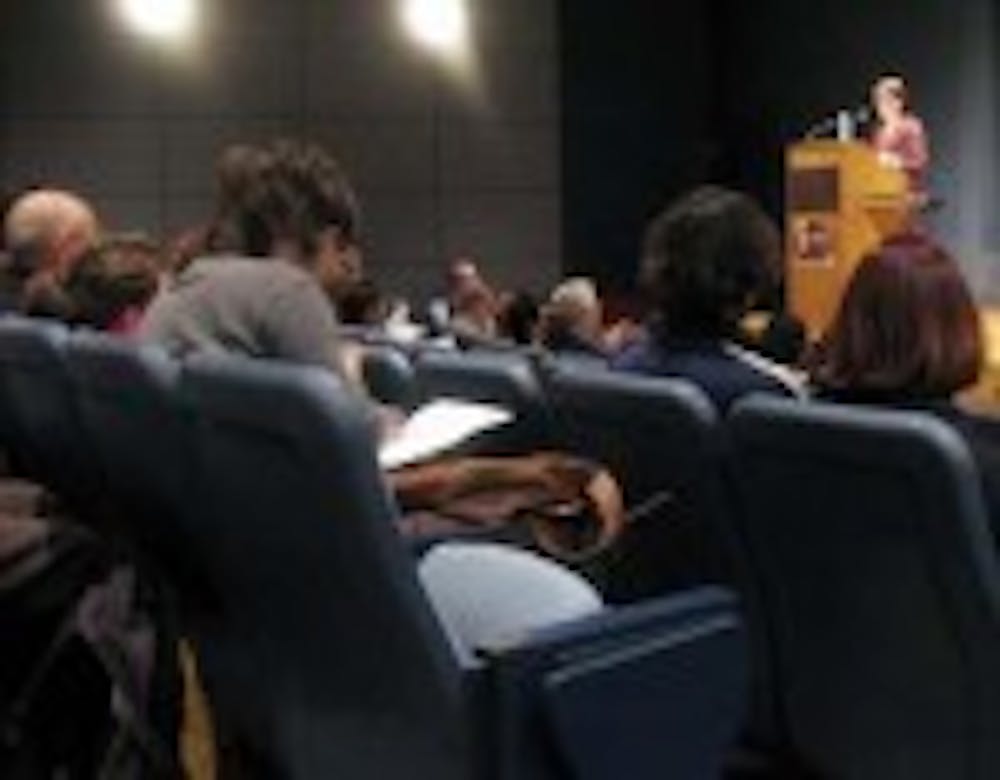While the case against UB art professor Steven Kurtz moves slowly towards a trial, members of the national academic and art communities drew a full crowd to the Center for the Arts Wednesday night for a symposium entitled "Art, Law and the Patriot Act."
Supporters of the embattled artist and popular professor gathered to discuss Kurtz's current situation and how the outcome of his pending trial could affect the arts, scholarship, law enforcement and our society as a whole.
Kurtz was arrested last May for the possession of bacteria cultures he kept in his house for his unique artwork. Local police discovered the bacteria while investigating the May 11 death of Kurtz's wife, Hope, who died in her sleep.
Originally, police and hazardous materials teams believed the cultures, which they referred to as "biological agents," played a role in Hope's death. That theory was proven false, but early in the investigation a joint terrorism task force was brought in and Kurtz quickly found himself under scrutiny for charges of bio-terrorism.
After a federal investigation, the bio-terrorism allegations were dropped and Kurtz was indicted on charges of mail fraud and wire fraud for illegally obtaining his samples of bacteria.
The event, which was organized by professors and students from the art and media study department and the UB Art Galleries, included presentations by fellow artists. Members of academia specializing in law, science and history also gave their perspective on the issues surrounding the charges Kurtz's faces.
"This event is really important because there hasn't been a lot of university or public discussion regarding Professor Kurtz," said Elizabeth Knipe, graduate media study student and event organizer. "We are trying to get the word out. Many people don't even know what happened to him last May."
Many students like Robin Brasington voiced support for Kurtz both as an artistic educator and citizen caught in the current political climate.
"Steve Kurtz is awesome and what the government is doing is wrong," said Brasington, graduate media study student.
Others were more cautious in their condemnation of the government's handling of Kurtz's investigation.
Albert Chao, fine arts and sculpture major, said he supports Kurtz but noted the difficulty of the relationship between domestic security and civil liberties found in today's national security based climate.
"The biggest thing is to know the facts surrounding the use of the Patriot Act," Chao said. "I see the points of the artists, but you wonder about the other side of the realm as well. It's a relationship between situational politics, not about them getting us."
Julie Perini, an adjunct instructor in UB's media study program, moderated the event. She opened the symposium by thanking the attendees, including the federal agents seated in the audience, and said the focus of the event was to clear up any confusion regarding Kurtz's situation.
"This has been many months in the making and is an opportune time for discussion of the Patriot Act, it's been in the news recently because of the different provisions that are set to expire," Perini said to the packed audience.
Kevin Heller, an assistant professor specializing in law and legal theory at the University of Georgia's School of Law, presented a PowerPoint lecture detailing some of the more severe measures of the Patriot Act.
Among the seven specialists who made presentations in their respected fields of study was Steve Barnes, a co-founding member with Kurtz of the Critical Art Ensemble, who presented a brief film that documented the methods and tactics employed by the federal investigators of Kurtz during his initial detention.
Other presenters included UB's Edward Herman, a government documents librarian at Lockwood Library, who presented his preliminary findings of a survey that examined how the War on Terror has affected campus life. Herman said he was surprised to find that in almost every category sampled, most people perceived that it has affected others more than themselves.
Other discussions focused on the effects the Kurtz case has had on the domestic art community as a whole, the historical context in which the incident occurred, and concerns regarding the continued centralization of biomedical research driven by political and economic interests, not science.





